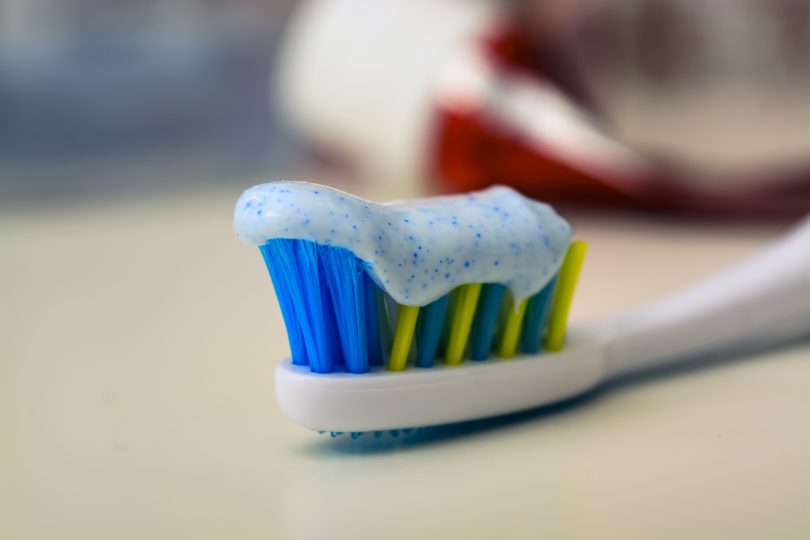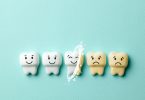Still rinsing your mouth after you brush your teeth?
It may seem like a strange question, but many dental experts say that no rinsing’s actually needed.
Yes, really.
Before you let out a collective, “Ugh!”, consider this: According to research, simply spitting out your fluoride toothpaste allows the fluoride to stay on your teeth and offers better protection from cavities.
That is—if you use a fluoride toothpaste.
Because in certain circles, fluoride has a bad name. It’s not natural, some claim. It’s toxic, say others.
But the reality is entirely the opposite, said Dr. Jan Mitchell, a dentist at the Dental College of Georgia. “Fluoridated water, for example, is one of the biggest public health successes in this country,” she said “It’s reduced cavities by 50 percent, which is huge. We know that topical fluoride offers benefits to absolutely everybody with any teeth at any age.”
Let’s talk about teeth
To understand why fluoride is so important, you need to know a little about tooth decay.
Physical brushing and flossing help remove plaque, which can cause gum disease that if left unchecked will cause us to lose our teeth. But brushing and flossing aren’t nearly as important for stopping cavities, which also lead to lost teeth.
Yes, you read that right.
That’s because cavities are caused by a certain type of bacteria in the mouth called Streptococcus mutans. Think of it as a hairy little monster who loves carbohydrates and sugary treats, everything from desserts and crackers to juice and soda. “It takes in those sugars and essentially spits out battery acid,” said Mitchell.
That acid then sticks to the teeth, demineralizing or dissolving enamel. This weakens the teeth and, if left unchecked, turns into cavities or holes. Over time, cavities can lead not only to expensive dental work, but lost teeth.
The good news is that our natural saliva is full of calcium and phosphate, and it does a pretty good job of healing and remineralizing our tooth enamel. “It does it all day long,” said Mitchell. But if we eat a diet that’s heavy on the sugar/white carb side, those bacteria can start a feeding frenzy and grow out of control, flooding the mouth with acid. And that’s when your dentist starts finding cavities.
“The only thing on our side is fluoride,” said Mitchell. “It’s our most powerful ally.”
Fluoride facts
The way fluoride works is that it is absorbed into the surface of the teeth and attracts minerals like calcium—essentially giving a boost to the body’s natural remineralization process.
Fluoride itself is a natural mineral that’s commonly found in the earth’s crust and even in certain water sources. It was back in the 1930s when researchers discovered that people drinking naturally fluoridated water had up to two-thirds fewer cavities than those who weren’t.
Yes, it’s true that there is such a thing as a toxic level of fluoride. “But you could say the same for any mineral, including common household items such as salt,” said Mitchell.
As long as we are using toothpaste appropriately, fluoride is entirely safe. “In fluoridated water, there are tiny levels, about one part per million,” she said. “Toothpaste has about 1,000 parts per million, and even high-fluoride toothpaste for tooth decay has about 5,000 parts per million.”
Brushing teeth at night is particularly important as your body’s saliva production shuts down during sleep, which also shuts down the remineralization process. But that coating of fluoride from your toothpaste will help the process continue, even while you’re sleeping.
A couple more things
In kids, when teeth are growing, fluoride mixes with tooth enamel to protect teeth from plaque and sugars.
But for young children especially, it’s important to follow a dentist’s recommendations on when to start using a fluoride toothpaste and how much to use. Most advise using just a rice-size smear to start with, especially for children who aren’t able to spit or rinse yet. And if someone does ingest too much toothpaste, call Poison Control.
If you want to further protect your child’s teeth from having cavities, don’t share spoons, advised Mitchell. If you have active cavities, you could be sharing not just that bite of yummy applesauce, but also a generous helping of Streptococcus mutans, which could infect the baby teeth.
For older adults, dry mouth can also lead to more cavities since the mouth doesn’t have as much saliva to rebuild the teeth. One way to help is to chew xylitol gum, such as the brand Ice Cubes, containing 100 percent xylitol (look for it as the first ingredient). Xylitol is a natural sugar alcohol, but it can’t be digested by Streptococcus mutans, so over time, it reduces bacteria numbers. “In fact, anyone can benefit from xylitol gum,” said Mitchell.
Still want to go non-fluoride? You can do it, said Mitchell, but if you want to keep your teeth, be prepared to cut down on sugars, including desserts, crackers, white bread, juice, soda and much, much more. Otherwise, even if you do use fluoride, it’s best to eat these treats in moderation at mealtimes only. “Fluoride is something that we know works. We have 70 years of population health research on this. It works,” said Mitchell.





